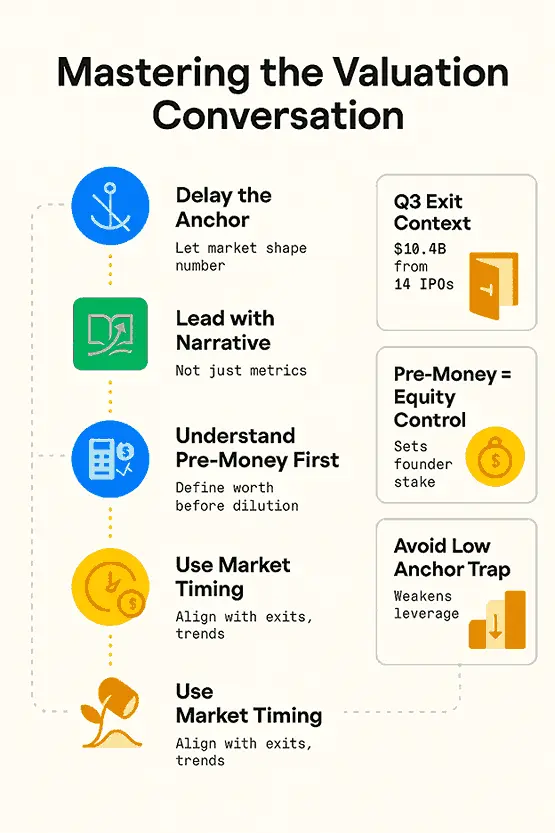Mastering negotiation in venture capital requires a blend of strategic insight and data-driven decision-making. This blog explores essential techniques, from anchoring valuations to handling lowball offers, offering actionable advice for founders seeking funding.
Across global markets, VC fundraising has transformed the opportunities, and risks, for startup founders. Recent market trends reveal growing founder opportunities. In 2024, global VC funding increased 7%, with $113 billion invested in Q4 and total funding reaching $371 billion. This signals a modest recovery for startups. Founders now navigate a competitive landscape fueled by fresh capital influx, making negotiation acumen more critical than ever.
With practical frameworks and real-world examples, this article equips entrepreneurs to confidently approach term sheet negotiations and secure favorable outcomes. Let's dive straight into it!
Understanding VC Relationships & the Benefits and Risks of Angel Investors
Venture capital isn’t just about funding, it’s about forging the right relationships. Founders should also consider the benefits and risks of angel investors when evaluating funding options.
Expert perspectives, such as Alan Wink’s analysis of VC dynamics and Cooley GO’s guidance on standing firm, provide valuable context. Key metrics, including the 83% inclusion rate for preference shares and the 15,766 VC deals recorded in 2023, highlight current trends shaping term sheet discussions.
Founders who understand how to attract venture capitalists are better positioned to cultivate interest and support during their funding discussions.
Identify Lead Investors vs. Followers
Securing a lead investor is pivotal for shaping the dynamics of your funding round. Angel investing often involves individuals who provide early-stage capital and guidance, differing from traditional VC roles.
To appreciate VC firm dynamics, global deal activity must be contextualized. In 2024, total VC investment volume reached USD368.3 billion worldwide, rising from USD345.7 billion in 2023. This surge demonstrates broad participation from lead and follower investors, highlighting the scope of negotiation opportunities for founders.
How Angel Syndicates Shape Early-Stage Negotiations
Building on the distinction between lead and follower investors, angel syndicates offer founders a way to access pooled capital and expertise. These groups invest collectively, often using nominee structures to simplify cap table management and reduce administrative complexity.
Syndicates can attract larger investments and provide strategic guidance, but may also introduce more voices into decision-making. Understanding syndicate dynamics helps founders anticipate negotiation challenges and leverage collective investor support.
1. Acknowledge Your High Points in Negotiations
Founders often overlook the strength hidden in their limited term sheets. Conducting thorough research into investor backgrounds can uncover valuable insights that shift the balance in your favor. Understanding the priorities and past investments of potential investors allows you to identify areas where your startup aligns with their goals.
Arming yourself with detailed data about your business metrics and market position further enhances your ability to negotiate effectively. This preparation not only builds confidence but also ensures you approach discussions with clarity and purpose.
Recognize the influence you hold and use it strategically to secure terms that benefit your long-term vision.
2. Key Risks When Engaging Angel Investors
- Angel investments are typically illiquid, meaning founders may face long waits before any exit opportunity arises.
- Minority control by angels can lead to limited founder autonomy if investor expectations are not clearly aligned early.
- High startup failure rates mean both founders and angels must prepare for the possibility of unsuccessful ventures.
- Pressure to deliver rapid growth and high returns can create tension in founder-investor relationships.
- Diverse syndicate membership may complicate decision-making and slow down strategic pivots during critical moments.
3. Avoiding Conflicts with Portfolio Company Opinions
Building relationships with a venture capital firm’s portfolio companies can seem beneficial, but it may complicate investment negotiations. Founders should recognize that such connections could unintentionally create conflicts of interest, particularly when impartiality is crucial in deal-making.
To maintain fairness, founders should politely decline referrals to portfolio companies if their business overlaps significantly. This approach ensures that negotiations remain unbiased and focused on the best outcomes for all parties involved.
4. Align Expectations Early to Prevent Angel Investor Conflicts
Beyond managing portfolio company opinions, founders should prioritize clear expectation alignment with angel investors from the outset. Discussing growth targets, return timelines, and preferred exit strategies helps prevent misunderstandings and future disputes. This proactive approach fosters trust and ensures both parties remain committed to shared goals throughout the investment lifecycle. Early alignment also streamlines negotiations and strengthens long-term partnership potential.
Negotiators should adapt their strategy based on the specific venture capital stages they are targeting to ensure alignment with investor expectations. Understanding these dynamics helps founders safeguard their interests while fostering professional relationships during investment negotiations.
What Does It Take to Master Valuation Conversations?
Valuation isn’t just a number, it’s a narrative. Founders who master these conversations blend timing, strategy, and market insight to anchor value without compromising leverage.
Valuation strategies must reflect outcome realities. In Q3 2024, public listings generated $10.4 billion in final exit value from just 14 companies. This highlights the stakes founders face when negotiating valuation and positioning for future exit success.

1. Set the Stage First, Don’t Rush to Anchor Your Valuation
Revealing your startup's valuation too early can unintentionally weaken your negotiating position. When founders disclose a valuation upfront, it often becomes a fixed reference point, or anchor, in discussions. If this figure is perceived as too low, it can limit your ability to negotiate for a higher valuation later, even if market conditions or investor interest suggest otherwise.
Instead, allow market data and investor feedback to shape your valuation organically. This approach ensures that your startup's worth reflects its true potential and aligns with current market trends. A strong grasp of the venture capital due diligence process helps founders proactively address investor concerns during negotiations, ensuring a more favorable outcome.
Let the market guide your valuation to avoid premature limitations and maximize your startup’s growth opportunities.
2. Focus on Pre-Money Valuation Discussions
Understanding pre-money valuation is essential for founders aiming to protect their equity. This metric establishes a company’s worth before any new investment, directly impacting ownership percentages and future dilution. By addressing pre-money valuation early, founders can set clear expectations for equity distribution and ensure fair deal terms.
These discussions also help mitigate dilution risks, as they define the baseline for calculating post-investment ownership stakes. When founders prioritize pre-money metrics, they gain greater control over their company’s trajectory while fostering transparency with investors.
Establishing clarity from the outset not only safeguards equity but also strengthens the foundation for long-term growth.
How To Turn a Lowball into a Tactical Advantage
A lowball offer doesn’t have to derail your fundraising journey. With the right mindset and strategy, it can become a powerful tool to spark leverage, sharpen your pitch, and attract stronger investor interest.
1. Smart Counters That Keep You in Control
Receiving a lowball offer from a venture capitalist can be frustrating, but how you respond can shape the outcome. The key is to remain calm and avoid reacting emotionally. Instead of dismissing the offer outright, consider its strategic potential. A low offer can serve as a starting point to ignite interest from other investors, creating a competitive dynamic that may lead to better terms.
Negotiating becomes more effective when founders focus on building relationships with venture capital firms to establish mutual trust and understanding. Focus on maintaining a professional demeanor and steering the conversation toward fair, balanced terms. Building trust and rapport with investors is crucial during this process.
Ultimately, your goal is to secure terms that align with your company’s value and vision. Confidence, preparation, and strategic thinking will help you turn a lowball offer into an opportunity.
2. Be Ready for the Lowball You Didn’t See Coming
Even the most amicable venture capitalists can occasionally present offers that fall below expectations. When faced with such proposals, it's crucial to maintain a level-headed approach. Emotional reactions can cloud judgment, making it harder to assess the true value of the offer. Instead, focus on the merits of the deal and whether it aligns with your startup's long-term goals.
Evaluate the offer based on objective factors, such as market trends, comparable valuations, and your company's growth potential. This ensures you can counter effectively or make an informed decision. Founders who understand how to secure venture capital funding can approach negotiations with a clear roadmap for success, even when surprises arise.
Navigating Equity, Ownership & Angel Investors Pros and Cons
Before diving into the negotiation process, it’s essential to grasp the basics of funding options available to startups. The benefits and risks of angel investors should be weighed carefully when considering equity and ownership implications.
Startup equity decisions shape future growth. In 2023, 4.73 million new business applications were filed across the United States. This intense entrepreneurial activity underscores the competitive imperative for careful equity allocation and ownership preservation.
Equity negotiations aren’t just about what you give up, they’re about what you preserve. Angel investing refers to individuals providing capital to startups in exchange for equity, which can impact ownership dynamics.
Founders must proactively manage ownership dynamics. This is especially important when navigating investor pressure around Employee Stock Ownership Plan (ESOP) terms.
1. Mastering ESOP Allocation Math for Fair Ownership
Balancing equity allocation is a critical task for startup founders, especially when venture capitalists (VCs) push for larger Employee Stock Ownership Plan (ESOP) pools. While VCs aim to minimize their own dilution, founders must ensure the ESOP aligns with market standards and supports future hiring needs effectively.
2. Understand Market Standard ESOP Percentages
Industry benchmarks for ESOP pools typically range between 10% and 20% of a company’s total equity. Early-stage startups often allocate closer to 15%, while later-stage companies may adjust based on hiring demands and growth projections. Founders should research comparable companies in their sector to establish a fair baseline.
3. Calculate Dilution Impacts Before Agreeing
Dilution can significantly affect a founder’s ownership stake. Before agreeing to a proposed ESOP size, calculate how it will impact your equity post-investment. For instance, increasing an ESOP pool from 10% to 15% could reduce your stake by several percentage points, depending on the company’s valuation. Modeling these scenarios ensures informed decisions during negotiations.
How Can You Effectively Manage the Deal Process?
Competitive fundraising creates deal management challenges. Through Q1 2024, 521 private market funds raised $295 billion globally. Founders must identify negotiation priorities that fit this capital-rich landscape to track, compare, and optimize competing offers.
Exploding term sheets often push founders into hurried decisions, but there’s a better way to manage these high-pressure situations. Proactively negotiating deadline extensions can provide the breathing room needed to fully assess offers and explore alternatives. This extra time is invaluable for gathering competitive bids, which can help you secure more favorable terms and avoid settling for less than optimal outcomes.
When requesting an extension, communicate your need clearly and professionally, emphasizing your commitment to making an informed decision. Use the additional time strategically to compare offers, refine your negotiation strategy, and strengthen your position. By taking control of deadlines, you can transform rushed decisions into confident choices that align with your long-term goals.
1. Identifying Core Negotiation Priorities
Effective negotiations hinge on identifying and concentrating on the most critical deal terms. Elements like dilution, liquidation preferences, and board control often define the success of an agreement. By prioritizing these major points, both parties can avoid unnecessary distractions and streamline the process.
Understanding what matters most to the investor ensures that expectations align, fostering smoother discussions. This approach not only simplifies negotiations but also minimizes potential conflicts over less significant details.
2. Embrace Creative Deal Structures
Stalled negotiations don’t have to mean the end of progress. Introducing inventive deal structures can transform impasses into opportunities. Solutions such as side letters allow parties to address specific concerns without altering the main agreement, while time-bound conditions create flexibility by setting deadlines for certain terms. These approaches enable both sides to achieve their goals while maintaining trust and collaboration.
Creative terms not only resolve deadlocks but also foster win-win outcomes that benefit all stakeholders. By exploring unconventional methods, businesses can unlock new paths to agreement and growth.
How Can You Develop a Personal Strategy for Successful Negotiation?
To negotiate effectively, you must first understand how you operate. Developing self-awareness allows you to refine your tactics, build emotional intelligence, and stay aligned with your long-term goals.
1. Enhance Self-Awareness for Negotiation Success
Self-awareness is a cornerstone of successful negotiation. Recognizing the benefits and risks of angel investors can inform your approach and lead to more effective strategies.
Regular self-assessment helps identify personal tendencies that may impact decision-making, allowing founders to adapt their strategies to align with their goals. Understanding one’s strengths and weaknesses creates a foundation for improvement, ensuring each negotiation is approached with precision and purpose.
By prioritizing self-awareness, founders can transform challenges into opportunities for growth and success.
2. Establish a Firm Bottom Line Early
Before entering any negotiation, it’s essential to establish your non-negotiable limits. Knowing your walk-away point ensures you can confidently reject unfavorable terms without compromising the integrity of your deal.
Clear boundaries act as a safeguard against undue pressure, allowing you to maintain control over the structure and outcome of the agreement. By defining these limits early, you create a framework that supports strategic decision-making and prevents emotional or reactive choices during discussions.
This proactive approach not only protects your interests but also positions you as a decisive and prepared negotiator, ready to secure the best possible terms.
3. Stand Firm with Conviction
Demonstrating unwavering confidence in your terms is a hallmark of effective leadership. When negotiating a venture capital round, clearly articulating your non-negotiables not only strengthens your position but also sets the tone for a balanced and mutually beneficial deal. Investors respect conviction, especially when it’s backed by a well-defined rationale.
By standing firm, you attract credibility and ensure your priorities remain intact. Clearly stated terms act as a foundation for robust negotiations, preventing ambiguity and fostering trust. This approach underscores your commitment to achieving a deal that aligns with your vision while maintaining fairness for all parties involved.
Conclusion
Negotiating with venture capitalists is no longer about passively accepting whatever lands in your inbox. In a market flooded with capital but ruthless on terms, founders who understand valuation, syndicates, angel dynamics, and ESOP mechanics can turn pressure into leverage. The real win isn’t just getting a term sheet signed; it’s shaping a deal that protects your ownership, aligns incentives, and gives your company room to scale on your terms, not the market’s.
If you’re ready to turn sharper negotiation into better cap tables, partner with Qubit Capital’s curated micro VC and VC investor network.
Key Takeaways
- Strategic communication is critical: carefully consider the benefits and risks of angel investors before making funding decisions.
- Effective management of lowball offers can stimulate competitive bids.
- Clear calculation and negotiation of ESOP allocations help preserve founder equity. Always weigh the pros and cons of angel investors before finalizing your funding strategy.
- Focusing on key priorities and establishing firm boundaries boosts negotiation power.
- Conviction and self-awareness are essential to secure favorable venture capital terms.
Frequently asked Questions
What does angel investing mean for startup founders?
Angel investing means receiving early-stage funding from individuals focused on startup growth. It offers founders both capital and valuable mentorship in initial phases.






